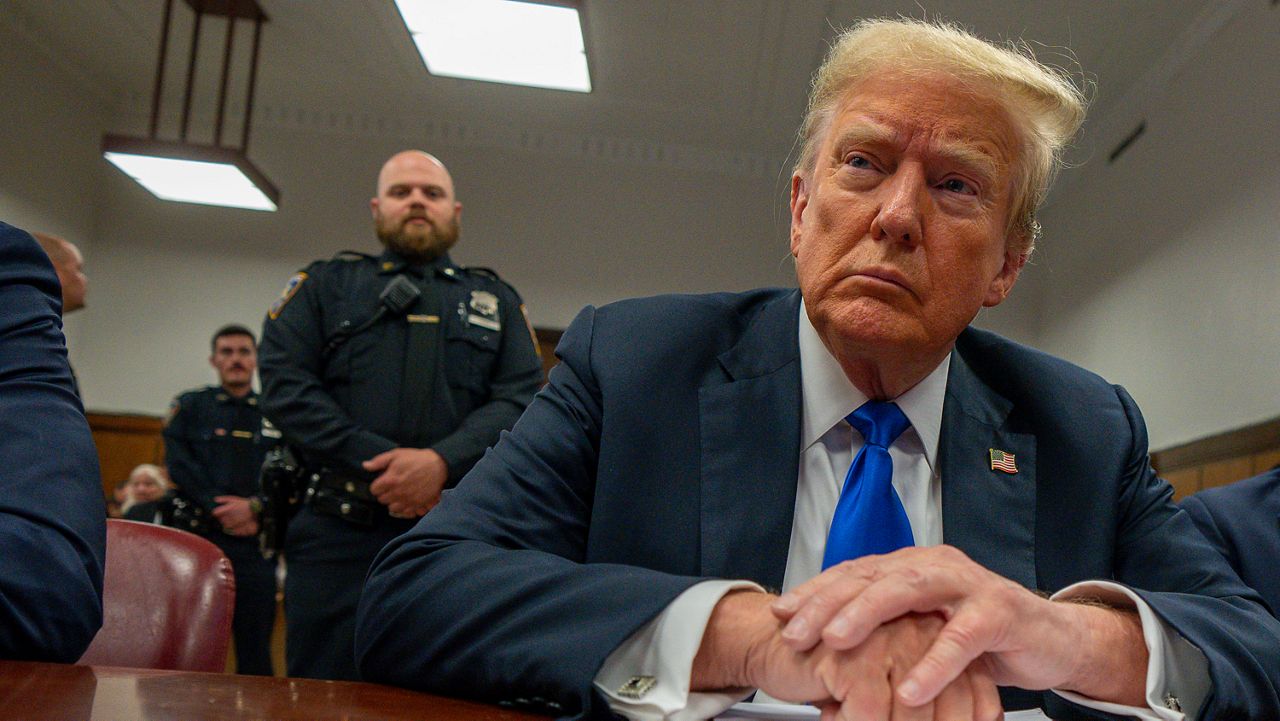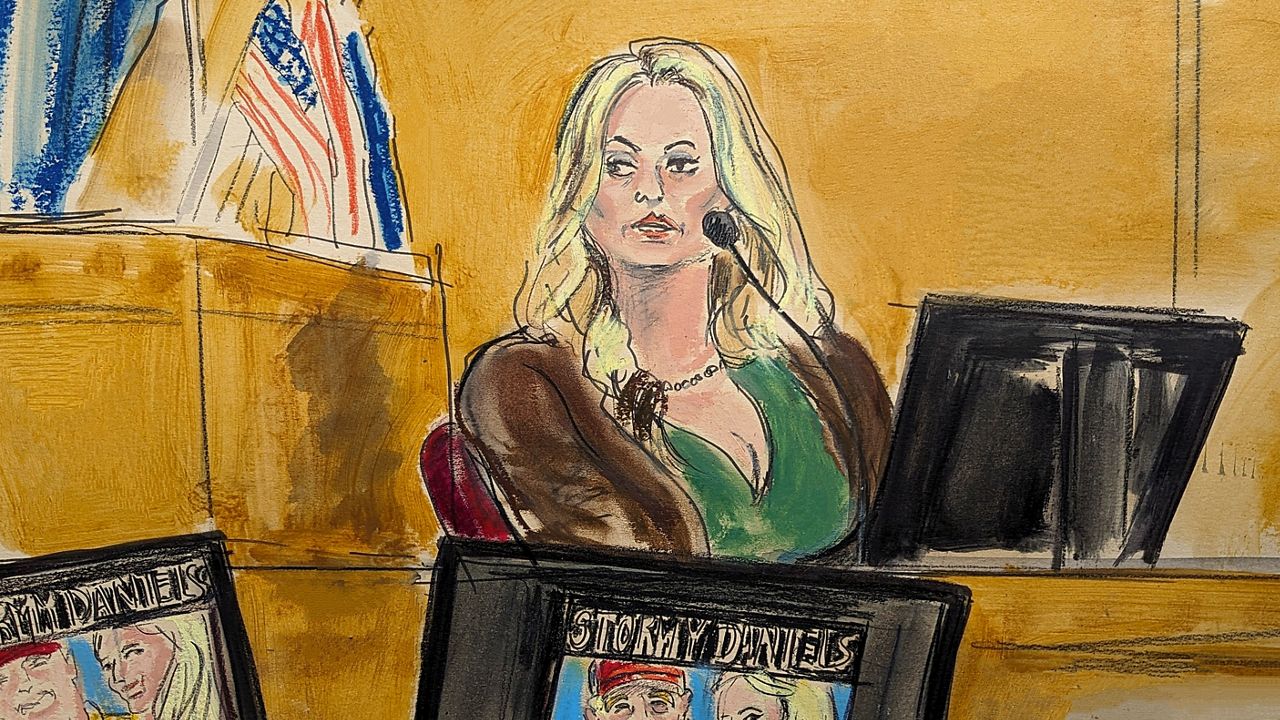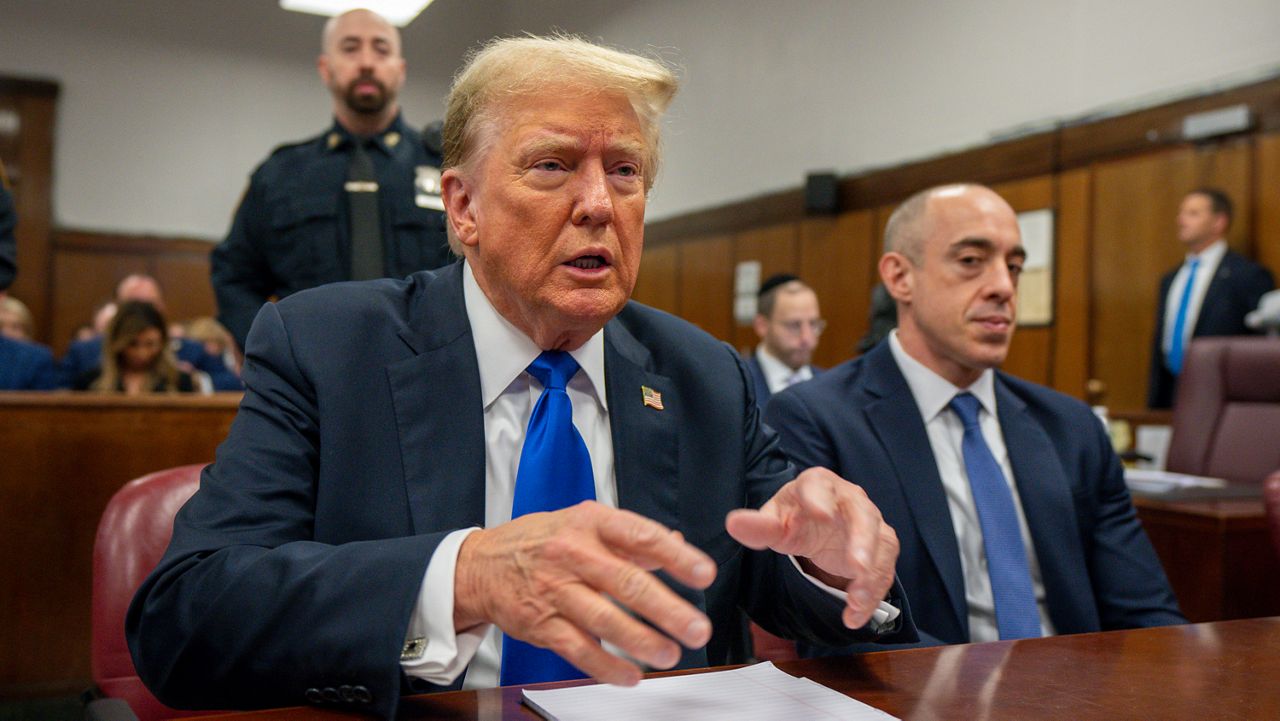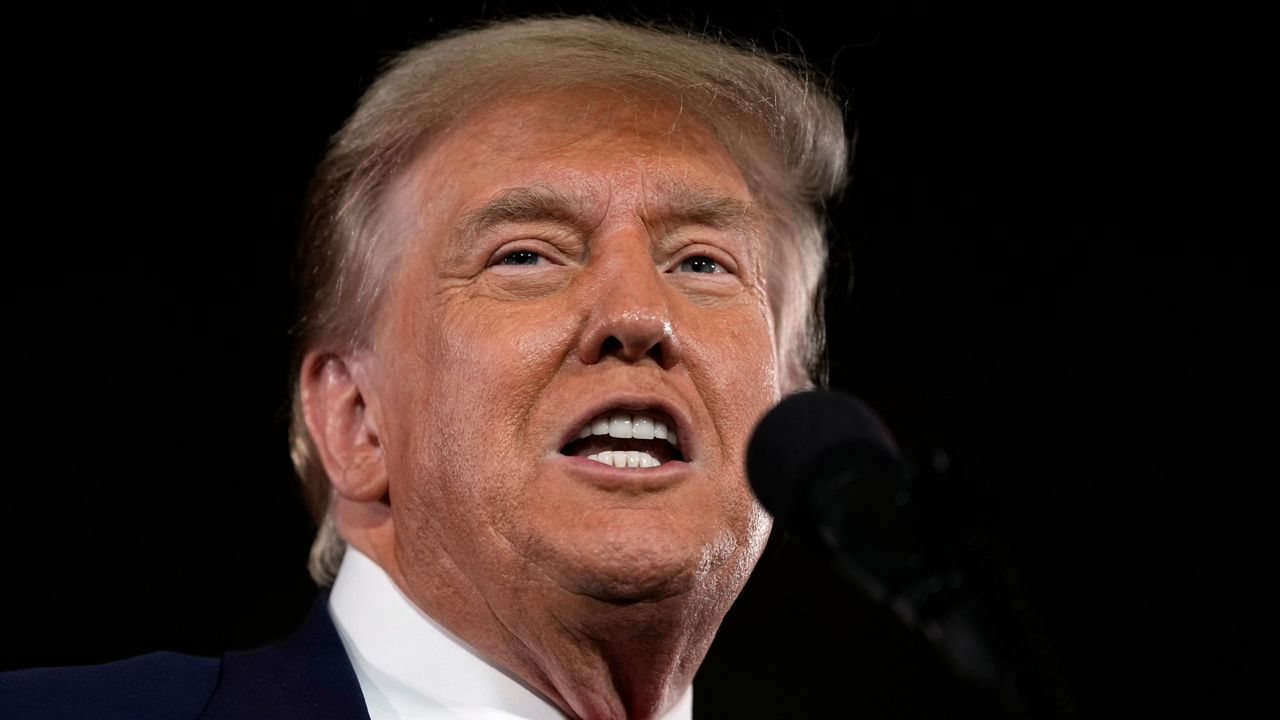A jury of twelve Americans found former President Donald Trump guilty on all 34 felony charges of falsifying business records in his New York City criminal hush money trial.
Trump, the presumptive Republican nominee in November's election, is the first former U.S. president in the nation’s history to be convicted of a crime.
Sentencing is scheduled for July 11, four days before the Republican National Convention in Milwaukee, where he will formally be nominated as the GOP's nominee for president.
“This was a disgrace. This was a rigged trial by conflicted judge who was corrupt. It was a rigged trial, a disgrace," Trump said as he exited the courtroom. "The real verdict is going to be November 5 by the people and what happened here everybody knows what happened here.”
“We didn’t do a thing wrong. I’m a very innocent man right now,” Trump continued, adding he will “fight for the Constitution” in “a nation in decline, serious decline.”
In brief remarks, Trump complained that Manhattan was too heavily Democratic and he wasn’t granted a change of venue. He also claimed Manhattan District Attorney Alvin Bragg was being influenced by George Soros, a Jewish businessman who donates to liberal causes and frequent right-wing bogeyman. He later announced on social media he would hold a press conference at 11 a.m. on Friday at Trump Tower in Manhattan.
“Twelve everyday jurors vowed make a decision based on the evidence and the law and the evidence and the law alone,” Bragg said at a press conference held after the verdict. "Their deliberations led them to a unanimous conclusion beyond a reasonable doubt that the defendant, Donald J. Trump, is guilty of 34 counts of falsifying business records in the first degree to conceal a scheme to corrupt the 2016 election."
"While the defendant may be unlinke any other in American history, we arrived at this trial and ultimately, today, this verdict in the same manner as every other case that comes to the courtroom doors," he added, framing the case as a typical white collar prosecution by his office and "core to what we do at the Manhattan District Attorney's Office."
The jury entered the courtroom at 5 p.m. on Thursday after informing Manhattan Criminal Court Judge Juan Merchan about 20 minutes before they had reached a verdict. Merchan read the verdict on each count one by one. He then thanked and dismissed the jury, telling them he would meet with them privately a short while later.
Trump’s attorney Todd Blanche immediately moved for a judgment of acquittal based on his claim the verdict was based on alleged perjury by Michael Cohen, Trump’s former attorney and fixer. Merchan swiftly denied his motion.
Falsifying business records in New York comes with a maximum prison sentence of four years, though Merchan could also decide for a lesser punishment than prison for the former president who has no other criminal convictions on his record.
Trump has 30 days after sentencing to inform the New York courts he plans to appeal, but the appeals process could drag on for months or even years. It is up to Merchan to decide if Trump will be required to serve his sentence while he fights for his appeal, though a higher court could be asked to rule on that as well.
Bragg on Thursday did not preview what his office will ask for in terms of sentencing, saying his team will speak through court filings in the lead up to the July 11 sentencing date.
The historic criminal trial lasted five weeks and kept Trump off the campaign trail for much of that, required to attend proceedings in person. The jury began deliberations around midday Wednesday and took all day Thursday to decide to find the lifelong New Yorker guilty of nearly three dozen felonies for lying on invoices, checks and ledgers to further a criminal conspiracy to break election laws during his 2016 presidential run.
Trump had pleaded not guilty and denied any wrongdoing, instead claiming without evidence the prosecution was orchestrated by his political enemies — including and especially President Joe Biden — to keep him from returning to power this November. He frequently made his case directly to the press in the halls of the courthouse on breaks and after proceedings ended for the day.
Biden has no role in the prosecutorial decisions of the Manhattan district attorney’s office and refrained from discussing the case publicly as it played out.
“In New York today, we saw that no one is above the law. Donald Trump has always mistakenly believed he would never face consequences for breaking the law for his own personal gain,” Biden campaign communications director Michael Tyler said. “But today’s verdict does not change the fact that the American people face a simple reality. There is still only one way to keep Donald Trump out of the Oval Office: at the ballot box.”
The White House commented through their counsel’s office, saying in a statement: “We respect the rule of law, and have no additional comment.”
Dozens of Republican allies, including vice presidential hopefuls and House Speaker Mike Johnson, R-La., took their turns attending the trial and then holding press conferences outside to slam the proceedings and attack witnesses and the judge’s daughter on Trump’s behalf, helping him circumvent a gag order that he was held in contempt of court for violating ten times. At one point, the judge threatened jail time if Trump continued to flout the order.
Johnson was among the scores of Republicans who quickly denounced the guilty verdict on Thursday.
“Today is a shameful day in American history. Democrats cheered as they convicted the leader of the opposing party on ridiculous charges, predicated on the testimony of a disbarred, convicted felon. This was a purely political exercise, not a legal one,” Johnson said in a statement. “The American people see this as lawfare, and they know it is wrong—and dangerous. President Trump will rightfully appeal this absurd verdict—and he WILL WIN!”
Fewer Democrats chimed in, with Senate Majority Leader Chuck Schumer and House Minority Leader Hakeem Jeffries — both of New York — opting not to release statements immediately after the verdict was announced.
The case centered on allegations of infidelity dating back to his decades as a celebrity businessman and tabloid star, and the financial crimes he committed during his first successful run for the White House in 2016 to pay off adult film star Stormy Daniels in exchange for killing her story of an affair. Held nearly 20 years after the alleged affair and eight years after the payments, the trial and conviction holds unprecedented implications for his attempt to return to power eight years later.
Neither being convicted of a crime nor being imprisoned disqualifies a U.S. citizen from running for president.
The prosecution, which resulted in the first of four separate arrests and arraignments of the former president in the last 14 months, was brought in March of last year. Trump angrily fought back against the case through his attorneys in the courtroom, through the highest-ranking Republicans in the country outside the courthouse and in his own public appearances and social media posts.
“These charges are rigged. The whole thing is rigged. The whole country’s a mess between the borders and fake elections. And we have a trial like this where the judge is so conflicted he can’t breathe. He’s got to do his job,” Trump railed in the downtown Manhattan courthouse’s hallway on Wednesday morning as the jury began their deliberations. “It’s a disgrace. And I mean it: Mother Teresa could not beat these charges.”
“This is all because of Joe Biden… The people that surround him in the office. They’re smart. They’re fascist, they’re communists, but they’re smart. And they’re ruining our country. But we’re going to win this election,” Trump continued. “Nov. 5 is going to be the most important day in the history of our country.”
In a campaign fundraising email sent out after the verdict, Trump referred to himself as a “political prisoner.”
The prosecution of a former president

Bragg, a Democrat elected to a county-level prosecutor role in 2021, impaneled a new grand jury in January of last year after an initial grand jury investigation started under his predecessor sputtered out. By March 30, 2023, Trump became the first former U.S. president to face criminal charges.
Within months, he would be charged with dozens of more crimes in three other jurisdictions by special prosecutor Jack Smith and an Atlanta-area district attorney in Georgia for crimes connected to his attempts to stay in power after his 2020 election loss, the Jan. 6, 2021, attack on the U.S. Capitol and his handling of classified documents after leaving office.
But it was the Manhattan business fraud case, in the city where Trump was born and raised and on the island where he built upon his father’s real estate empire, that was the first trial to be heard and may be the only prosecution to be heard by a jury before November’s election.
The 34 counts were for allegedly falsifying invoices, checks and ledger entries as part of a scheme to pay back his longtime attorney and fixer Michael Cohen for $130,000 in hush money payments given to Daniels, the adult film star who says she had an affair with the married Trump in July 2006. The payments were made as Trump ran for president in late 2016 and ran through early 2017.
While Bragg emphasized his belief in the seriousness of falsifying business records in Manhattan — “the financial center of the world,” he said last April when Trump was arrested and arraigned — the charges were bumped up from misdemeanors to felonies because prosecutors argued the records were falsified in furtherance of another crime: unduly influencing the 2016 presidential election.
But in what some legal experts described as a “novel” tactic, Bragg did not charge Trump with violating New York election law, the crime prosecutors argued Trump falsified business records to help commit. The specific law cited makes it criminal for two or more people to “to conspire to promote or prevent the election of any person to a public office by unlawful means.”
“Although you must conclude unanimously that the defendant conspired to promote or prevent the election of any person to a public office by unlawful means, you need not be unanimous as to what those unlawful means were,” Merchan instructed the jury on Wednesday.
The jury had three options to consider for the “unlawful means” underlying each of the charges. They were allowed to consider whether falsifying each business record was done to illegally influence the 2016 election by violating campaign contribution limits outlined in the Federal Election Campaign Act, by submitting false information on a tax return or to help falsify additional business records.
The prosecution was required to prove, Merchan said, that Trump both falsified the business records and that he “did so with intent to defraud that included an intent to commit another crime or to aid or conceal the commission” of another crime.
Trump’s team argued that Cohen was an unreliable narrator, having turned on his old boss in the years since the payments and pleaded guilty in 2018 for lying to Congress. His testimony was key to prosecutors’ case as he was the one who made the payments to Daniels on Trump’s behalf.
But Trump’s attorney Blanche made the case in his closing arguments that Cohen, now a liberal media darling who frequently needles Trump publicly, was “a witness that outright hates the defendant, wants him in jail, is actively making money off that hatred.”
The jurors appear to not have been convinced by Blanche’s argument.
The trial itself was heated at times, with the judge frequently reprimanding Trump and his attorneys for their behavior in the courtroom. At one point, a witness called by the defense, former Cohen legal advisor Robert Costello, was acting so poorly in Merchan’s eyes, he cleared the courtroom of the jury, the press and the public to restore order. Trump himself was hit with a gag order and held in contempt of court ten times for violating it by commenting on witnesses, the judge’s daughter and others in public remarks.
The 78-year-old presidential candidate also appeared to fall asleep at several points during the proceedings
The payments

By October 2016, Trump’s friends at the National Enquirer tabloid had already paid off one other woman who alleged an affair and a former doorman at Manhattan’s Trump Tower who claimed to have a story of an illegitimate child fathered by Trump (the former president denies any wrongdoing and the woman involved in the latter story denies it’s true). So when the infamous “Access Hollywood” tape was published on Oct. 7 of that year — featuring audio of Trump speaking vulgarly during a 2005 taping of the entertainment news show about assaulting women — there was renewed concern in his camp that further tales of infidelity and sexual liaisons could damage his campaign, prosecutors argued and Cohen testified at trial.
Daniels, who had previously tried to tell her story to InTouch magazine in 2011 and had a representative pitching it to outlets to no avail earlier in 2016, was informed that Cohen was interested in buying her story in the days after the tape’s release, she testified earlier this month. Three days after the tape’s publication, with the campaign in turmoil, a non-disclosure agreement and the promise of $130,000 was presented to her to sign.
After some back and forth and delayed payments, a deal was reached. Cohen would spend the next few months trying to get reimbursed for the $130,000, ultimately receiving a total of $420,000 the following year as Trump began his first months in the White House, former Trump Organization controller Jeffrey McConney testified. On the 11 checks, 12 invoices and 11 ledger entries created for those payments, they were falsely classified as legal expenses or a retainer for Cohen. That alone would qualify as misdemeanor falsifying business records, but prosecutors sought the felony convictions because of what the illegally-disguised payments were for: unlawfully protecting Trump’s presidential campaign.
“He said to me, ‘this is a disaster, total disaster. Women are going to hate me. Because this is really a disaster, women will hate me. Guys may think it's cool, but this is going to be a disaster for the campaign,’” Cohen recalled Trump saying of Daniels in October 2016. “He told me to work with [then-National Enquirer publisher David Pecker] and get control over this, purchase the life rights, we need to stop this from getting out.”
Daniels, who testified in at times graphic detail at the trial, says she met Trump at a celebrity golf tournament in Lake Tahoe, Nev., and the two had a sexual encounter. Trump’s wife of less than two years at that point, Melania, would have just given birth to their son Barron that March.
While Trump’s sons Don Jr. and Eric attended the trial with some frequency and defended him outside the courthouse, Melania did not make it to New York to appear with her husband.
“He wasn’t thinking about Melania. This was all about the campaign,” Cohen testified last week, describing Trump’s mindstate at the time.
To prosecutors, that was key. Trump’s team argued that the then-candidate was more concerned by the damage the Daniels story could do to his family in the wake of the “Access Hollywood” tape's release than he was with his campaign.
“Nobody wants their family to be subjected to that sort of thing. Doesn’t matter whether you are running for office. Doesn’t matter if you are running ‘The Apprentice,’” Blanche said in his closing argument. “It doesn’t matter if you are just a normal everyday person in the city. Nobody wants their family exposed to that type of story.”
But prosecutors argued that if Trump wanted to protect his family from Daniels’ story he would have tried to pay her off at some point in the ensuing decade after their alleged encounter. Cohen testified he had helped kill the InTouch magazine story in 2011 and Daniels had been shopping her story in 2016. It was only that October when the campaign was facing “catastrophe,” as former Trump aide Hope Hicks testified, that Trump sought to quiet Daniels.
“It’s no coincidence that the sex happened in 2006, but the payoff didn’t take place until Oct. 27, 2016, less than two weeks before the election,” Manhattan assistant district attorney Joshua Steinglass said in his closing argument. “And that’s because the defendant’s primary concern was not his family, but the election.”
Three other prosecutions
Trump still faces three other prosecutions: a federal prosecution in Washington for actions taken during his bid to stay in power after his 2020 election loss, another federal case in Florida focused on his handling of classified documents and a racketeering prosecution in Georgia’s Fulton County over his efforts to overturn his 2020 election loss in that state. But it’s unclear if any of the three will go to trial before this November’s election.
The Florida classified documents case had its May 20 trial date canceled and no new one set as the judge there awaits a Supreme Court ruling on Trump’s argument in the Washington case that presidents are immune from federal prosecution for acts committed while in office. The justices heard arguments in April, but it is unclear when they will reveal their decision. If the federal trials are delayed past the election and Trump returns to the White House, he could order the Justice Department to dismiss the cases or pardon himself.
In Georgia, Fulton County District Attorney Fani Willis indicted Trump and 18 others, including his White House Chief of Staff Mark Meadows, on charges of engaging in an illegal conspiracy to overturn Trump’s 2020 loss in the state. Four of the 18 have pleaded guilty after cutting deals with Willis’ team, while Trump and 14 others have pleaded not guilty. Trump and his co-defendants have asked an appeals court in Georgia to kick Willis off the case over allegations of an improper relationship with another prosecutor, delaying the case for now.
“Our whole country is being rigged right now. This is done by the Biden administration in order to wound or hurt an opponent, a political opponent and I think it’s just a disgrace and we'll keep fighting,” Trump said after hearing the 34 guilty verdicts early on Thursday evening. “We’ll fight to the end and we'll win. Because our country has gone to hell. We don’t have the same country anymore. We have a divided mess.”







